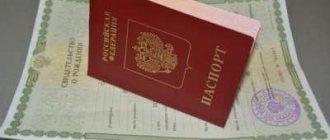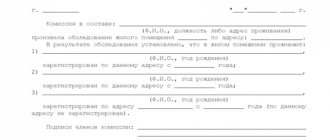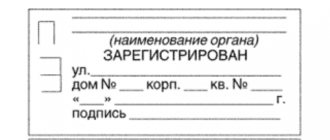Differences between registration by place of residence and place of stay
Registration at the place of residence is often called “propiska”, but this is a relatively outdated term that is no longer used in many places. It is definitely not in the 2021 regulations. But “permanent registration” is common. Permanent registration is confirmed by a special mark that is placed in the passport. Thus, permanent registration at the place of residence is usually carried out in relation to real estate that is owned by a person.
Where you stay is a little different. Typically, a citizen registered here is not the owner of the property, but is in it on a temporary basis. For example, he rents a house. Moreover, you can register at your place of residence regardless of what type of permanent registration a person has at your place of residence. They run parallel and independently of each other.
Registration at the place of stay is not recorded in the passport with a special stamp, but the person who receives it is issued a certificate. Temporary registration allows you to quickly find a citizen if for some reason he does not live in his home. For example, he left to work or study in another city.
Place of residence is the place where a citizen of the Russian Federation is actually located. It may be identical to the place of registration or stay. The Main Directorate for Migration Affairs of the Ministry of Internal Affairs must be notified that the place of residence has changed. A week is given for this after the move. If a citizen will live here for more than 90 days, then registration should be completed. You can register at your place of stay or residence in 3-8 days. The exact timing will depend on how the documents were submitted.
Types of registration
Issues of registration in residential premises are regulated by the law on the right of citizens of the Russian Federation to freedom of movement N 5242-1 and Government Decree No. 713.
According to the above acts, there is accounting:
- at the place of stay (temporary registration);
- at the main address (permanent).
The staging is carried out specifically in a residential area, i.e. an apartment, house, room with satisfactory living conditions. There is a legislative ban on registration in non-residential premises, apartments, and emergency housing.
The common factor for both types is the methods of submitting the application and documents. Both foreigners and citizens of the Russian Federation can receive the service.
Applicants apply:
- in the migration departments of the territorial bodies of the Ministry of Internal Affairs of Russia;
- in the MFC (“My Documents”);
- through the State Services portal.
There are much more differences between types of registration.
They are:
- in terms;
- in the types of premises in which one or another registration is possible;
- final document confirming the right of residence;
- options for deregistration (including for children);
- nuances of registration in different types of housing (private house, apartment, dorm room, etc.);
- in some restrictions on rights in the field of social and financial services (for example, receiving regional social benefits).
Constant
This implies registration at the address of the living space where a person primarily lives or owns property. A person must declare their intention to register permanently at a new address within a week.
Features of the registration type:
- unlimited;
- issued with a registration stamp in the passport;
- automatic deregistration is possible if the place of residence changes within the same region (the new registration cancels the old one);
- shorter terms for obtaining various documents (for example, international passports).
Permanent registration is issued:
- owners for themselves, family members, relatives;
- tenants of a municipal apartment under a social tenancy agreement for themselves and their household members.
This type of registration gives the right to live on the premises, use the housing and address to receive government and financial services. But only the owner can dispose of the apartment/house (sell, change, etc.). This benefit is called the right to living space.
For example, a man bought an apartment and issued documents in his name. Then he got married. He registered his wife in the apartment, but did not transfer part of this property to her. The husband is the owner and has the right to living space. The wife is a user and has no rights to housing.
Interesting article: Registration of military personnel at a military unit
Temporary
The very word “temporary” implies registration with a limited period of residence. Legally, the period varies from 90 days to 5 years. It is documented by a certificate of registration at the place of residence.
Required:
- people who have been living outside their permanent place of residence for a long time for various reasons (for example, a business trip);
- students who came to study in another city;
- foreigners with a migration card or visa;
- citizens who do not have permanent registration due to life circumstances.
You must register within 3 months if you plan to stay in the locality beyond this time. Except if the temporary residence is in the same subject of the Federation where the person has permanent registration. In this case, registration at the residence address is not required.
Temporary registration does not oblige you to be removed from permanent registration if you have one.
Consent of other residents for registration at the place of residence
How easy it is to obtain registration in an apartment at your place of residence depends on whether it is your apartment or not. If a person cannot even claim a share in an apartment, he will be able to register in it only after permission has been received from all owners. Moreover, consent must be formalized. The owner and other people registered in the apartment must personally attend the reception at the registration authorities, or give someone else a notarized consent to the procedure in question.
Sometimes a citizen rents housing in a state or municipal fund and has a child. In this case, a rental agreement, social lease, use (free of charge) is concluded. If this is your case, there is no need to take permission from other employers. It’s another matter if the name of the employer does not appear in the contract. Then registration will be possible only in a number of cases:
- registration of the employer's child is required (provided that the child is under 14 years of age);
- another member of the tenant’s family must be registered, and there are no objections from other parties to the rental agreement and the landlord.
It is important that during registration, the consent of the landlord and his family members is expressed in personal presence. This applies even to a child who is 14 years old. Sometimes it may be necessary to draw up an additional agreement to the rental agreement if a child under 14 years of age is registered.
Existing types of registration
According to Russian Legislation, there are 2 types of registration:
- constant;
- temporary.
The first has to do with a person’s place of residence, the second – with his place of stay. In the first case, we are talking about people staying in a certain living space for a long time. This is the official place of residence of the citizen.
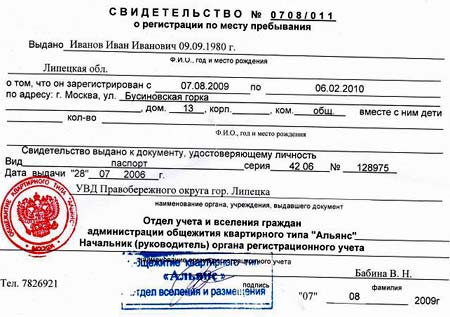
This is what a certificate of temporary registration in Moscow looks like
The second is related to the ability of individuals, whether Russians or guests of the country, to exercise their rights. For example, a person can obtain a patent for a temporary address. This type of registration requires a citizen to remain in a certain region for more than 90 days.
Where can I register?
The Housing Code of the Russian Federation allows persons to carry out both types of registration in any type of residential premises. In this case, the word “residential” is key. You can record your location:
- in the apartment;
- in a house (residential);
- a certain part of a residential building;
- room;
- parts of the apartment, etc.
You can learn more about temporary registration in the video below.
When it comes to registration of a temporary nature, a citizen can register himself in the territory:
- medical institution;
- sanatorium;
- hotels;
- apartments, etc.
Both types of registration are allowed only on the condition that the legal owner of the area gives official consent to recording the location of citizens on its territory.
It is important to keep in mind that the tenant does not have any rights to claim ownership of the rental premises.
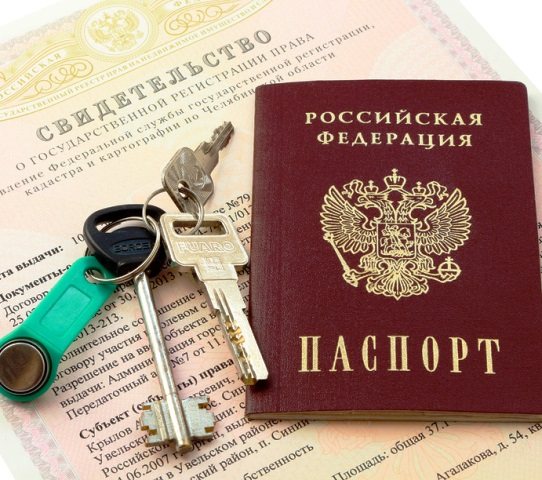
Upon receipt of housing, registration is made permanent
It is possible to register citizens at their place of residence without providing the consent of the owner when it comes to housing under the jurisdiction of the municipality. In this case, a contract for social rental of premises is concluded.
Registration in privatized housing
All owners and members of their families can register in privatized housing. The owner has the right to register his child who has not reached the age of majority. The procedure must be carried out in the presence of one of the parents. While discharge cannot be carried out without first obtaining the consent of the guardianship authorities.
Citizens can also be registered in houses included in dacha communities. In this case, the following conditions must be met:
- summer cottages are the only place where a citizen can live, otherwise he will receive the status of a homeless person;
- the dacha building is private property;
- the plot of land on which the object is located is located within the boundaries of a populated area;
- the building is officially recognized as residential.
You can learn more about the registration of a foreign citizen from the video.
If a citizen is registered at his place of residence in an area that is owned by a third party, it is necessary to provide written confirmation of the owner’s consent to the citizen’s registration. In some cases, migration authorities require the personal presence of the owner of the living space.
Documents for registration at the place of residence
To obtain a permanent type of registration in an apartment or house where you have the right of residence, you will need to collect documents for registration. First of all, you must have a passport to prove your identity. Next, you need to collect papers that can be considered the basis for obtaining registration.
For example, if the applicant has an apartment, he only needs to present a certificate of ownership of the property. He will be able to obtain a permanent registration. If you are renting a home, a tenancy agreement for the right of temporary registration is sufficient. Sometimes a court decision can be used, which confirms the person's right to use the housing in question.
Also, if one of the registered persons is a citizen over whom guardianship or guardianship has been established, an act from the guardianship authority is needed stating that the guardian has been officially appointed. You will definitely need an application, which is drawn up according to Form No. 6. You can fill out this form in person when you get an appointment, or by using the State Services portal. Then the form will be filled out online.
The format for registering a minor who is not yet 14 years old is slightly different. The child's legal representative (his parent or guardian) must collect a slightly different list of documents. Including the following papers:
- Instead of a passport, you will need to prepare a birth certificate;
- parents/guardians must confirm their identity with a passport (other identical document);
If guardianship has been established over the child, you will have to present a certificate from the guardianship authorities. Also, some documents must be collected by the owners of the property (if the applicant himself is not the owner of the property and his name is not in the rental agreement). They must also provide proof of identity and ownership of the property.
Where to apply for registration
Place of residence and registration must be registered. Once you have collected your documents, you should submit them to the correct address. You can do this in several ways, choosing the one that is most convenient in your case:
- using the State Services portal;
- through, selecting the area where the house or apartment is located;
- by contacting the management company, having first made sure that the range of its services includes the tasks of the passport office;
- residents of Moscow, more precisely Troitsky and Novomoskovsky admin. districts can register to submit documents to the MFC through the mos.ru portal.
Usually, the virtual option of submitting residence documents is more preferable, since then you will only have to take time off from your affairs once - to pick up the documents. Another thing is personal presentation. First you go to submit documents, then to pick them up. If you are not the owner, you will have to submit documents not only yourself, but also taking with you all the owners of the property.
Online submission is more convenient in this sense because it takes less time. The application will be processed within three days after submission. Then the applicant will be invited to put a stamp stating that you have a residence permit in the house. If the registration is temporary, you need to invite not only the applicant, but also people who are ready to temporarily share with him a living space that their new neighbor has nothing to do with (does not own it).
When visiting in person, you need to take all the documents listed above. In particular, a passport, certificate of ownership and other documents confirming claims for housing. An additional lease agreement may also be required for state or municipal property, even if we are talking about temporary registration.
In addition, it is important to draft the application correctly. You can fill it out according to the following example.
Register for a child
The permanent registration of children under 14 years of age corresponds to the place of registration of their parents or guardians. This is also true for incapacitated citizens. To register children and incapacitated citizens, the consent of the homeowners is not required, provided that the child’s guardians are already registered there. This eliminates the need for homeowners to visit a government agency when submitting an application.
Moreover, it is not necessary that both parents have the right of residence. But when the second parent is registered at a different address, his consent is required for the operation. When registering a child, you should not put a mark in his personal documents; in return you will receive a certificate. But for children over 14 years of age, the procedure is identical to registration for adults.
What is the difference between registration and temporary registration?
- Temporary registration is a formalized certificate (Form No. 3) issued to a person at the place of temporary stay for a period of up to 5 years (specific dates depend on the agreement between the citizen and the homeowner). After the expiration of the period specified in the document, it is necessary to extend its validity. The rights acquired upon receipt of the certificate are valid for the specified time. Some social benefits and benefits are not available.
- Registration is a stamp in the passport indicating the citizen’s actual place of residence (specific address). This public service is issued with an unlimited validity period and provides the citizen with all possible rights, benefits and privileges.
- The holder of a passport with a stamp is given the right to participate in privatization and full use of residential premises;
- To register, you must obtain written consent (in the form of an application) from the owner of the residential premises;
- Subsequent registration of children is carried out automatically (regardless of the wishes of the owner);
- As the number of residents increases, the cost of some housing and communal services increases proportionally.
We recommend reading: Tax deduction for teeth
Apply for registration for a student and military personnel?
Temporary registration of citizens of the Russian Federation may be required for military personnel and students. Military personnel can be registered not only at their place of stay, but also at their place of registration. True, everyone is registered at their place of residence on a general basis, except for sailors, sergeants, conscripts and soldiers. Registration at the place of stay can be obtained by military personnel who have a vacation ticket or travel certificate. But only on condition that the business trip lasts more than 90 days. Contract servicemen, officers and conscripts can be registered on the territory of a military unit. Their family members can receive the same registration.
Full-time students of universities and vocational schools who live in a dormitory during their studies must register here. In order for temporary registration to be carried out correctly, you need to contact the official authorized to accept such applications. You must register within three days of receiving a place in the hostel.
What is registration and how does it differ from registration?
A citizen who is away from his place of residence for more than 90 days must obtain temporary registration at the nearest department of the Federal Migration Service (FMS). It is also important to obtain the consent of all owners for registration. This certificate is issued in person and will be needed by people temporarily living in rented housing, in a hotel, campsite, hospital, sanatorium or nursing home. Upon expiration of the period specified in the application, it will end automatically. The maximum period of temporary registration is 5 years.
Since the collapse of the Soviet Union, the registration system has changed and become simpler, but in order to take full advantage of the opportunities offered by the state, a person needs to notify the state of his whereabouts. If you are staying at a specific address for more than 90 days, you must register. It is divided into two types:
We recommend reading: Regional benefits for twins in Irkutsk
Registration documents in one package when changing place of residence
After you have changed your place, you need to mark your new residence by contacting. In this public services center you can complete the entire package of documents and receive a variety of services:
- use parking after receiving a resident residence permit;
- receive a subsidy for housing and communal services, as well as transfer recalculation of payments for housing and communal services;
- accept applications for pension delivery, pension file request, etc.;
- military personnel can receive a document about changes in military registration;
- obtaining benefits for citizens who may qualify for them.
These services can only be received after a registration mark has been placed on the document. You can find out more about what rules and features when preparing documents on the official website of government services or by making a request to the help desk of the Russian Federation. For Moscow this is the phone number +7 (495) 777-77-77.
How to get permanent registration if you have no housing
In the Russian Federation, not all citizens have permanent registration, but many need it. According to the norms prescribed in the Constitution of the Russian Federation, all citizens have the right to housing. This obliges the state to help people who do not have housing and cannot earn it themselves. Of course, no one will buy apartments for everyone. Typically, such programs are intended for citizens who are left homeless. For example, after a dilapidated house is resettled or if we are talking about a large and low-income family.
Sometimes you can take out a mortgage, pay maternity capital as a down payment on an apartment, apply for a subsidy, etc. You don't have to buy a whole apartment. You can also get a permanent registration if you only bought a room in an apartment or an inexpensive house in the village. Therefore, it is much safer for a citizen to take care of his own home, where he can obtain the right to reside. Temporary registration, of course, can help out in some situations, but it is associated with some risks. Although having temporary registration allows you to use all basic government services.
You can get legal assistance on registration or residence registration issues on our website.



